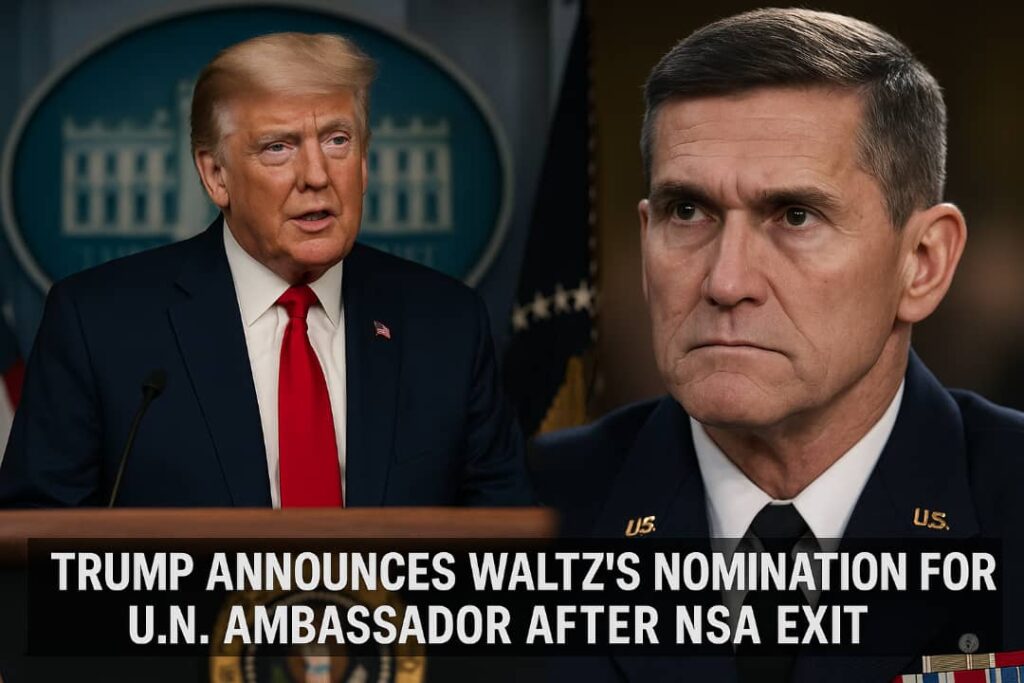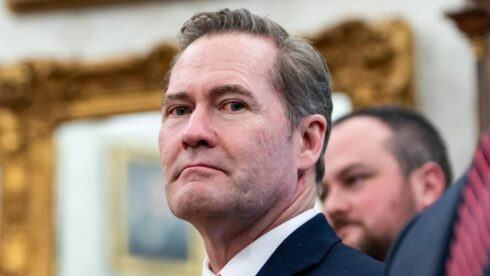National Security Adviser Mike Waltz is stepping down from his White House post, but President Donald Trump quickly reassured supporters that Mike Waltz’s departure was not a dismissal. In a post on Truth Social, Trump announced that Waltz would be nominated as the next United States Ambassador to the United Nations, praising his “hard work to put our Nation’s Interests first” throughout his military, congressional, and advisory career.
“I am pleased to announce that I will be nominating Mike Waltz to be the next United States Ambassador to the United Nations,” Trump wrote. “From his time in uniform on the battlefield, in Congress, and as my National Security Advisor, Mike Waltz has worked hard to put our Nation’s Interests first. I know he will do the same in his new role.”
The decision came just hours after reports of Mike Waltz’s imminent exit from the National Security Council (NSC) began circulating. Waltz, in a post on X, said he was “deeply honored to continue [his] service to President Trump and our great nation.”
Rubio to Temporarily Fill NSA Role Amid Transition
In an unexpected move, Trump named Secretary of State Marco Rubio as the interim national security adviser, creating an unusual dual-role situation that caught even senior officials off guard. State Department spokesperson Tammy Bruce learned of the development during a Thursday press briefing, responding with surprise when questioned by reporters. “It is clear that I just heard this from you,” she said.
Sources confirmed that a Thursday morning meeting between Rubio and Mike Waltz was held to coordinate the transition, although many within both the State Department and the NSC were unaware of when exactly Rubio would officially assume the interim role. Deputy Secretary of State Christopher Landau reportedly was not briefed on the matter in advance, underscoring the tightly held nature of the decision.
Chief of Staff Susie Wiles held multiple meetings on Thursday to address the transition, which appears to be part of a broader reorganization of Trump’s national security apparatus. Deputy National Security Adviser Alex Wong’s future at the NSC remains uncertain.
Fallout from Signal Scandal Looms Over Departure

Although Waltz’s exit is being framed as a reassignment rather than a forced resignation, his departure follows a March controversy in which he mistakenly included journalist Jeffrey Goldberg in a Signal group chat discussing classified military operations. The chat revealed details of planned U.S. strikes on Houthi targets in Yemen. Goldberg initially withheld specifics but later published operational details after top officials claimed no classified data had been leaked.
White House officials acknowledged internally that the blunder was significant, sparking debate over whether Mike Waltz should resign. However, Trump declined to remove him at the time, calling him “a good man” who had “learned a lesson.” Sources close to the NSC suggest that enough time has passed to allow Waltz’s reassignment to be interpreted as a routine transition rather than fallout from the scandal.
Democratic Senator Mark Warner acknowledged Mike Waltz’s mistake but credited him for taking responsibility. Still, Warner predicted a tough Senate confirmation hearing, remarking, “I think it would be pretty brutal. Let’s see what happens.” In contrast, Republican Senator John Cornyn expressed confidence in Waltz’s confirmation and praised his continued service.
NSC Shakeup Reflects Deeper Turmoil and Loyalty Politics
Waltz’s departure follows the dismissal of at least six NSC staffers in early April, shortly after right-wing activist Laura Loomer reportedly presented Trump with opposition research identifying individuals she deemed insufficiently loyal. That event marked the beginning of an intensified loyalty purge within the NSC, sources said.
Wong, who served in the Trump administration previously and helped negotiate the former president’s summit with North Korean leader Kim Jong Un, has yet to comment on his status. Speculation is rampant regarding who may permanently fill the national security adviser post, with potential candidates including Trump loyalists such as senior adviser Stephen Miller and counterterrorism director Seb Gorka. Special presidential envoy Ric Grenell publicly stated he does not want the job.
Insiders suggest that Trump wanted to handle Mike Waltz’s departure delicately to avoid giving the impression that external pressure forced his hand. “This was a face-saving maneuver,” one source said. “Waltz didn’t want to go, and Trump didn’t want to fire him, but the writing was on the wall.”
Senate Confirmation Battle Looms as Mike Waltz Awaits Next Chapter
If confirmed, Waltz would assume the high-profile diplomatic post of U.S. Ambassador to the United Nations amid heightened global tensions and scrutiny over America’s foreign policy direction. While Trump’s loyalists rallied behind the nomination, Democratic senators have signaled a contentious confirmation process ahead.
Waltz is expected to face tough questions regarding the Signal incident and his judgment in handling sensitive information. However, supporters argue his military credentials and continued trust from President Trump will carry weight with the GOP-controlled Senate.
As the national security landscape continues to evolve under Trump’s leadership, Waltz’s reassignment highlights the former president’s balancing act between loyalty, optics, and operational control. Whether Waltz can rehabilitate his public image and earn Senate approval remains to be seen—but his journey from embattled adviser to potential U.N. ambassador is already one of the most dramatic transitions of this administration’s second term.














